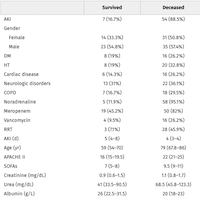Endothelial Glycocalyx Degradation Contributes to Metabolic Acidosis in Children After Cardiopulmonary Bypass Surgery
journals.lww.com
Our data show that metabolic acidosis (increased strong ion gap) is associated with plasma concentration of heparan sulfate, a negatively charged glycosaminoglycan cleaved from the endothelial glycocalyx during cardiopulmonary bypass.
In addition, cleavage of heparan sulfate was associated with renal dysfunction, capillary leak, and global markers of cardiovascular dysfunction.
These data highlight the importance of designing translational therapies to protect the glycocalyx in cardiopulmonary bypass.
We recruited 27 patients, 5 days to 57 months old. We prospectively sampled plasma prior to, during, and following cardiopulmonary bypass at predefined time points.
We measured plasma concentrations of interleukin-6 (inflammatory marker), heparan sulfate (negatively charged glycocalyx glycosaminoglycan), and syndecan-1 (neutrally charged glycocalyx protein).


















